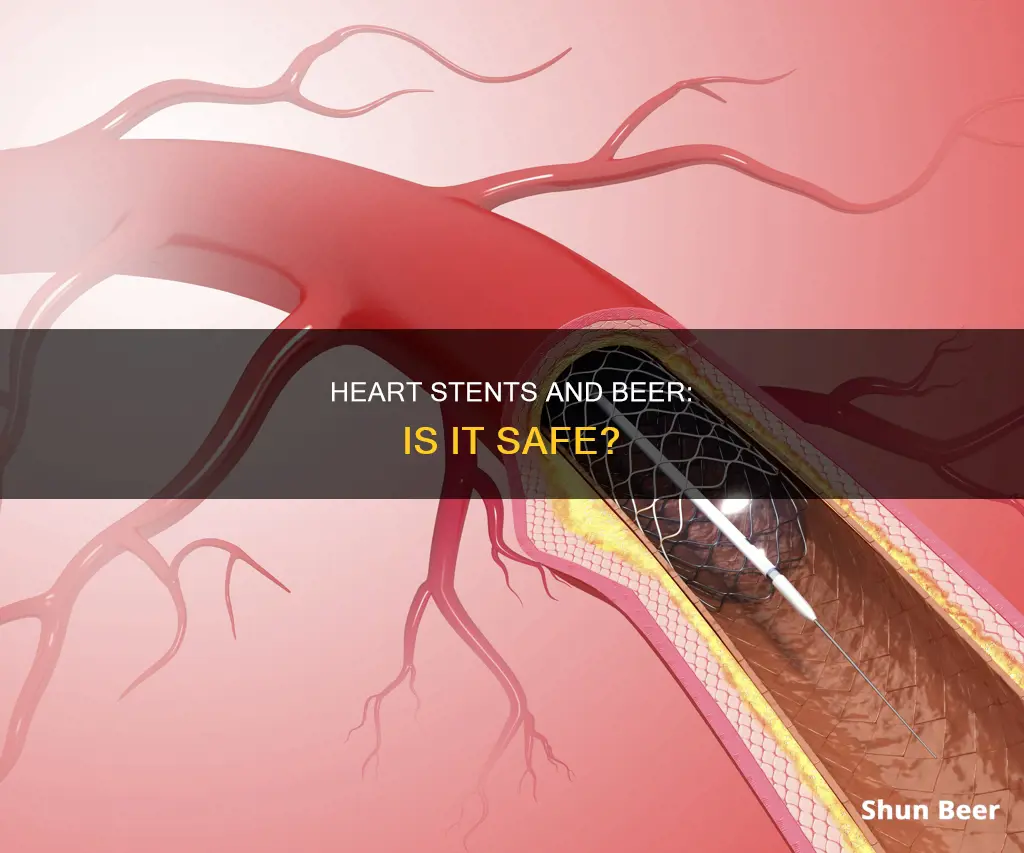
Drinking alcohol after a heart stent procedure is generally considered safe and appropriate, provided it is consumed in moderation. Moderate alcohol consumption has been linked to a reduced risk of heart attacks and coronary artery disease, with red wine, white wine, beer, and liquor all offering similar benefits. However, heavy drinking can negatively impact the heart, liver, and other organs. It is important to consult with a doctor, as alcohol can increase blood pressure and interact with certain heart medications. Patients should also be mindful of lifestyle changes and medication regimens recommended by their healthcare providers to ensure a full recovery and maintain healthy heart function.
| Characteristics | Values |
|---|---|
| Can you drink beer after a heart stent? | Generally, moderate alcohol consumption is safe and appropriate for most people with a coronary stent. However, you should discuss this with your doctor, as alcohol consumption can raise blood pressure, and alcohol can interact with certain heart medications. |
| Recommended alcohol consumption | For men, the best "dose" is one to two drinks a day, counting 5 ounces of wine, 12 ounces of beer, or 1½ ounces of liquor as one drink. Women are advised to limit themselves to one drink a day. |
| Alcohol and heart health | Many medical studies have linked alcohol to a reduced risk of heart attacks, particularly in men over 60 and others at heightened risk. Alcohol can reduce the risk of coronary artery disease and is linked to increased levels of HDL ("good") cholesterol. However, heavy drinking is bad for the heart and circulation. |
What You'll Learn
- Moderate alcohol consumption is generally considered safe after a heart stent procedure
- Alcohol can interact with certain heart medications, so it's important to consult a doctor
- Alcohol consumption can raise blood pressure, which is a key consideration for those with heart stents
- Men who consumed 50-700g of alcohol per week had significantly less coronary restenosis and repeat angioplasty
- It is recommended to avoid alcohol for the first month after a heart attack to allow the heart to recover

Moderate alcohol consumption is generally considered safe after a heart stent procedure
A study published in the *Heart* journal in 2004 supports the idea that moderate alcohol intake can protect against restenosis in patients who have undergone angioplasty and stent implantation. The study examined 225 men with 346 stents among them and found that those who consumed 50 to 700 grams of alcohol per week had significantly lower rates of coronary restenosis and repeat angioplasty, as well as a lower mean loss of coronary artery luminal diameter, compared to those who drank less than 50 grams per week.
Another source suggests that for men, one to two drinks per day can provide heart-healthy benefits, particularly in terms of cholesterol levels. However, it is important to note that heavy drinking can have negative effects on the heart and circulation, as well as on other organs such as the liver. Therefore, it is recommended to limit alcohol consumption to moderate levels and consult with a healthcare provider to determine what amount is considered moderate for an individual's specific situation.
It is worth noting that recovery from a heart stent procedure typically requires medication and lifestyle changes. It is important to follow the advice of the healthcare team to reduce the chances of any complications and ensure a full recovery.
Get Rid of Your Beer Gut: Tips for a Trimmer You
You may want to see also

Alcohol can interact with certain heart medications, so it's important to consult a doctor
A heart stent procedure involves inserting a small mesh tube into an artery where plaque has built up and narrowed the space for blood flow. While moderate alcohol consumption is generally considered safe and appropriate for most people with a coronary stent, it is important to consult a doctor, as alcohol consumption can raise blood pressure and interact with certain heart medications.
Alcohol can adversely interact with hundreds of commonly used medications, including those for heart conditions. These interactions can lead to intensified side effects, such as sleepiness, drowsiness, dizziness, and light-headedness, which may interfere with concentration, coordination, and the ability to operate machinery or drive a vehicle. In some cases, alcohol may decrease the effectiveness of medications or even make them toxic to the body.
Heart medications that can interact with alcohol include ACE inhibitors or ARBs (e.g., lisinopril or losartan), alpha-blockers (e.g., clonidine or doxazosin), antianginal agents (nitrates) (e.g., nitroglycerin or isosorbide), beta-blockers (e.g., atenolol or metoprolol), diuretics (e.g., hydrochlorothiazide or furosemide), and calcium channel blockers (e.g., verapamil or amlodipine).
When alcohol is combined with these medications, it can cause side effects such as dizziness, a fast heart rate, fainting, drowsiness, low blood pressure, or an increased risk of falls and injuries. Additionally, alcohol can affect liver enzymes, altering drug levels in the bloodstream and potentially worsening side effects or reducing the effectiveness of medications.
It is crucial to be transparent with your doctor about your alcohol consumption, as well as any medications, supplements, or herbal products you are taking. They can advise you on the safe limits of alcohol consumption and help you understand the potential risks and interactions with your specific heart medication.
Beer and Medication: Is it Safe to Drink with GL?
You may want to see also

Alcohol consumption can raise blood pressure, which is a key consideration for those with heart stents
According to the American Heart Association, the recommended alcohol intake for people who choose to drink is no more than two drinks per day for men and one drink per day for women. A drink is typically defined as 12 ounces of beer, 5 ounces of wine, or 1.5 ounces of liquor.
It is worth noting that excessive alcohol intake can lead to high blood pressure, heart failure, or stroke. Therefore, it is crucial to stick to moderate levels of alcohol consumption and not overindulge.
Beer and Breastfeeding: What's Safe?
You may want to see also

Men who consumed 50-700g of alcohol per week had significantly less coronary restenosis and repeat angioplasty
A study published in the *Heart* journal in 2004 examined the influence of alcohol consumption on the restenosis rate in men who had undergone percutaneous transluminal coronary angioplasty (PTCA) and stent implantation. The study included 225 male patients who had undergone PTCA and stent implantation and had another angiogram 6 months later. The patients were asked to fill out a questionnaire regarding their drinking habits.
The results of the study showed that men who consumed 50-700 grams of alcohol per week had significantly lower coronary restenosis and repeat angioplasty rates compared to those who drank less than 50 grams per week. Specifically, the restenosis rate was 33.7% in the higher alcohol consumption group compared to 48.8% in the lower consumption group, and the repeat angioplasty rate was 23.3% vs 42.5%, respectively. Additionally, the higher consumption group had a lower mean late loss of the luminal diameter (1.1 mm vs 1.45 mm).
Multivariate analysis showed that alcohol consumption was independently and significantly associated with restenosis, repeat angioplasty, and loss of the luminal diameter. The odds ratios for restenosis and repeat angioplasty were 0.54 and 0.39, respectively, indicating that alcohol consumption was associated with a reduced risk of these outcomes.
The study concluded that alcohol intake is associated with reduced restenosis after PTCA and stent implantation. These findings suggest that moderate alcohol intake may protect against restenosis in patients undergoing angioplasty and stenting. However, further studies are needed to confirm these results and determine the underlying mechanisms.
Beer Drinking: What's the Right Amount?
You may want to see also

It is recommended to avoid alcohol for the first month after a heart attack to allow the heart to recover
It is generally recommended to avoid alcohol for at least the first month after a heart attack to allow the heart to recover. This is because alcohol can interact with heart medications and raise blood pressure, which increases the risk of a heart attack.
Heavy drinking can lead to high blood pressure, heart failure, or stroke. Excessive alcohol intake can also contribute to cardiomyopathy, a disorder that affects the heart muscle. Alcoholic cardiomyopathy enlarges and distorts the heart, weakening the muscle and preventing it from pumping blood efficiently.
However, moderate alcohol consumption is considered safe and appropriate for most people with a coronary stent. According to some studies, moderate alcohol intake is associated with a lower risk of dying from heart disease. Moderate drinking is defined as one drink per day for women and one to two drinks per day for men.
It is important to note that the benefits of moderate alcohol consumption are open to debate, and the consensus among medical professionals is that the drawbacks of alcohol far outweigh any potential benefits. Therefore, it is crucial to follow the advice of your healthcare team and not rush your recovery after a heart stent procedure.
Beer Tastes Better After a Good Workout: Why?
You may want to see also
Frequently asked questions
Generally, moderate alcohol consumption is considered safe and appropriate for most people with a coronary stent. However, it is important to discuss alcohol consumption with your doctor, as it can raise blood pressure and interact with certain heart medications.
While moderate alcohol consumption may be safe, it is important to follow the advice of your doctor and healthcare team regarding acceptable amounts. Excessive alcohol consumption can negatively impact the heart and circulation, as well as other organs.
It is recommended to refrain from drinking alcohol for at least the first month after the procedure to allow your heart to recover.
Moderate alcohol consumption has been linked to a reduced risk of heart attacks and coronary artery disease. Alcohol, particularly red wine, can boost levels of HDL ("good") cholesterol.







